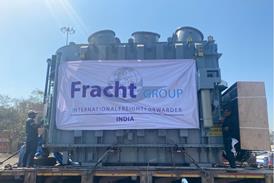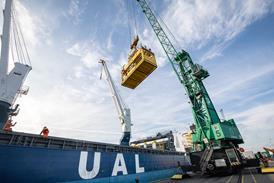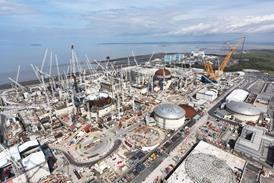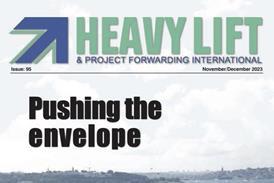All Article articles – Page 6
-
 Article
ArticleMining sector digs deep to lead logistics recovery
Covid-19 disruption and commodity price volatility have caused delays to projects in all industry verticals. Despite the turbulence, mining projects appear to be better placed than most to ride out the crisis, writes David Kershaw.
-
 Article
ArticleWest Africa power projects set to lead logistics rebound
Demand for power in West Africa has helped project cargo markets limit the impact of Covid-19. However, future recovery will depend on a solution to the region’s growing maritime security problems, reports David Whitehouse.
-
 Article
ArticleLarger turbines bring capacity pressures for project logistics
Larger turbine components, the geographical spread of their location and increasing deployment of floating installations are presenting new challenges and investment requirements for logistics companies servicing the offshore wind power sector, writes Phil Hastings.
-
 Article
ArticleExpansion in the Horn of Africa
Landlocked Ethiopia has liberalised its logistics market as it aims to become a lower-middle income country by 2025. With a dynamic market economy, the country has the potential to become the engine of East Africa.
-
 Article
ArticleHopes of Spanish logistics recovery after short-term shock
This time last year, confidence in Spain’s wind energy sector was high and the outlook was bullish in spite of long-running political uncertainty. With a coalition government now in power, the country is among those worst hit by the Covid-19 pandemic – but projects are continuing, writes Megan Ramsay.
-
 Article
ArticleOn the ocean: Financial meltdown
“Back in 2007 business was good in project cargo,” said Martin Lanting, founder of diversified brokerage 24Vision, based in Rotterdam. “Everything was at record levels, and the offshore energy business was at big numbers. Oil was creeping up to USD100 a barrel and everyone was very excited. Until October 2008. After the demise of Lehman Brothers and the financial crisis, everything dropped dramatically, almost overnight.”
-
 Article
ArticleOn the ocean: Climbing out of the Crisis
Common themes were apparent when industry chiefs were asked to identify the most disruptive events to affect the heavy lift and multipurpose shipping sector since 2007.
-
 Article
ArticleOn the ocean: Project cargo gateways
The advent of containerisation revolutionised the role of the port in the logistics supply chain. Breakbulk gateways saw their traditional cargo base eroded as the mantra ‘that anything that can go in a container, will do so’ continued to ring true.
-
 Article
ArticleOn the ocean: Red Box weathers the storm
One company that has been weathering the storm in the shipping sector is ZPMC-Red Box energy services, which founder Philip Adkins attributes to the company’s commitment to changing the business model under which logistics contracts that underpin major energy infrastructure projects are won. Adkins says that he was already predicting ...
-
 Article
ArticleOn the ocean: Environmental matters
December 12, 2015, heralded a significant step towards lowering global greenhouse gas emissions (GHG) with the signing of the Paris agreement on climate change. As part of global efforts towards combatting climate change, environmental concerns have led to an increased focus on regulations in the shipping sector. The International ...
-

-
 Article
ArticleNetworks: Building trust
When HLPFI was launched a decade ago, there were just a handful of project freight forwarder networks. Now there are more than 15 dedicated to this niche sector of the logistics industry – and, it seems, more can be expected.
-
 Article
ArticleShippers and forwarders: State of Flux
Will freight forwarders survive as shippers increasingly go direct to carriers and equipment suppliers? Opinion is divided on the long-term future role – or even survival – of the traditional forwarders that handle heavy lift and project cargoes.
-
 Article
ArticleAirfreight: Changing Relationships
A multitude of developments witnessed over the course of the past decade have forced airlines and charter brokers to become increasingly resourceful in order to meet the requirements of a project logistics sector that has grown ever more complex.










